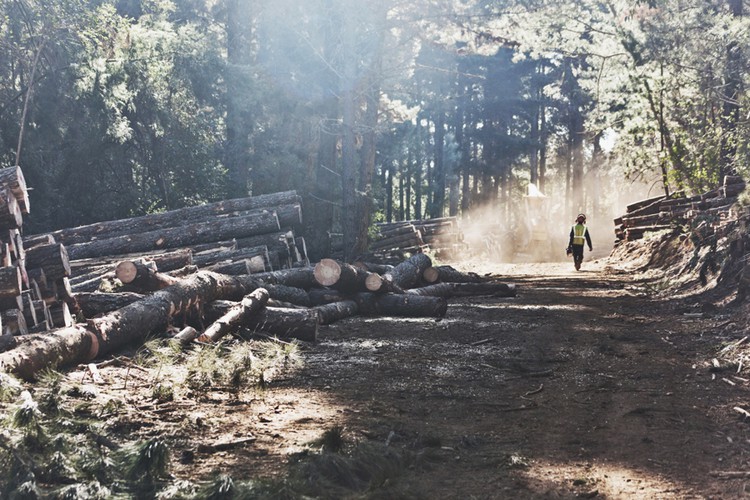
Residents of the remote village of Sonskyn fear for the future of their jobs - and their village. Photo: Luke Daniel
29 May 2018
Woodsmen and their families who have lived for decades in the remote community of Sonskyn in the Southern Cape face an uncertain future. The pine plantation is to be handed over to the Department of Agriculture and Forestry, but no-one in the community knows if their jobs will survive
“Nobody really knows what’s going to happen,” Ntuthu Ponoyi says.
“Of course, the community is worried. Where will they go?”
Ponoyi works for Mountain To Ocean (MTO), the commercial forestry company which has managed the vast pine plantations of the Southern Cape for decades. Now the plantations are to be handed over to the Department of Agriculture, Forestry and Fisheries (DAFF) as part of an “exit strategy” agreed on in 2000, when the government announced the phasing out of certain commercial plantations belonging to the South African Forestry Company Limited (SAFCOL). The reason given for the decision at the time was that the plantations were not viable and forestry was not the right use of the land.
The area initially involved was just over 8,000 hectares in Buffelsnek, where Sonskyn is located. There have since been counter-proposals by the company and an independent evaluation. But with no clear deal in sight, a socio-economic disaster looms over Sonskyn.
“By 2020 we’re out of here. It’s part of a deal with the government – it’s been a long time coming, and our hands are tied,” Tommy Eckley says. He’s been the main manager in the Buffelsnek region for many years.
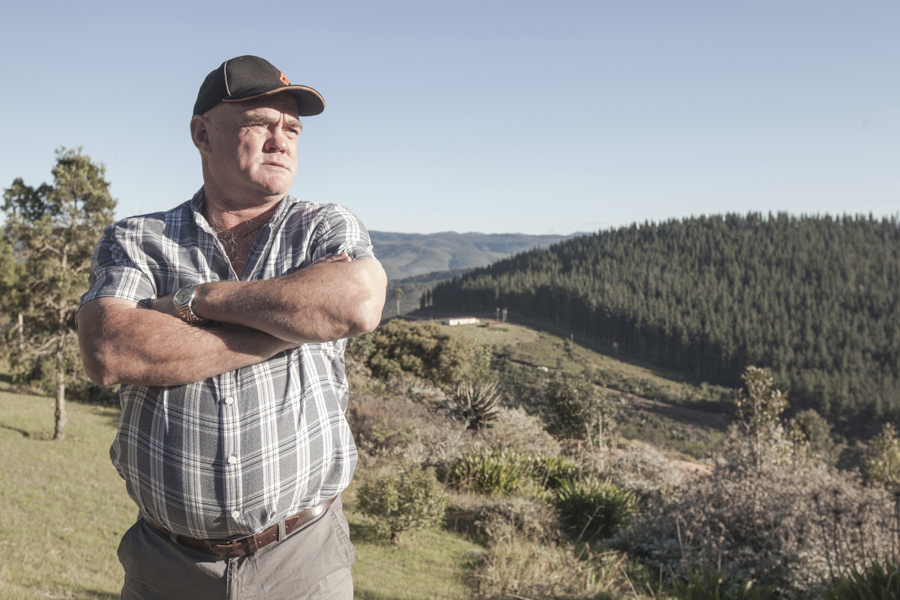
Tommy Eckley manages over 8,000 hectares of pine plantations. Photo: Luke Daniel
“They say that there will be no more work here in 2020, I’ve heard them (MTO) talking about it,” says chainsaw operator Hannes, who’s been working for the company for five years. He did not want to give his surname.
“We’ll have to wait and see. Nobody from government has come here; they don’t care about our future.”
Sonskyn has no commercial or medical facilities, limited eco-tourism opportunities, and only a dilapidated school that serves as an informal daycare centre. The nearest commercial hub is Knysna, 30km away on a winding dirt road, potholed by the passage of timber trucks and a lack of maintenance. Residents often hitchhike on the long road, or hang onto logging trucks, to shop in Knysna for supplies.
Two residents sit outside one of the wooden cottages and describe their pursuit for sustainable employment. “Gabon” used to work as a “choker-setter”, chaining the logs for the company. “It was hard work, and when I saw people losing their jobs, I thought, ‘Am I next?’ So I left, and got a part-time job on a farm nearby as a mill-operator – at least I know I will have work in the future.”
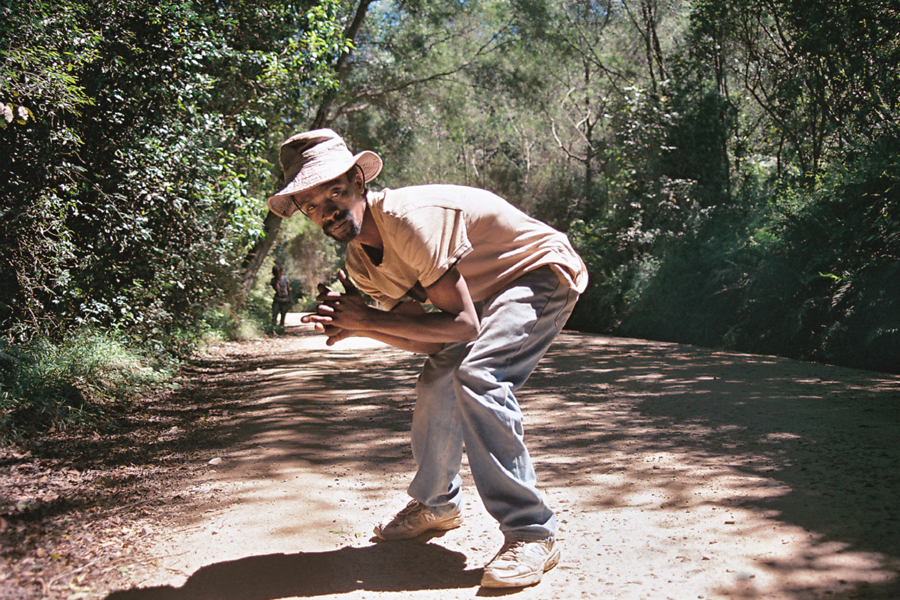
Sonskyn resident “Gabon” waits on the long dirt road to Knysna, hoping for a lift into town. Photo: Luke Daniel
Gabon and his friend Christopher “Cribo” have found forestry work for private landowners in the area, providing them with a stable income and a level of certainty no longer available to the Buffelsnek families.
But rather than offer work to the people of Buffelsnek many local landowners choose to make use of cheap immigrant labour (mainly Malawians) which has inflated xenophobic tensions in the area.
Most of the forestry workers remain unskilled and will battle to find work outside the industry - or even within it. The DAFF has yet to implement any kind of skills development program within the community of Sonskyn.
“I’ve lived here all my life. My husband worked in the forests and died a long time ago,” Aunt Lucie (who did not give her surname), one of the oldest residents of Sonskyn, tells GroundUp. “Now where must I go? I’m too old to move away. I haven’t got family that I can go to. I really don’t know.”
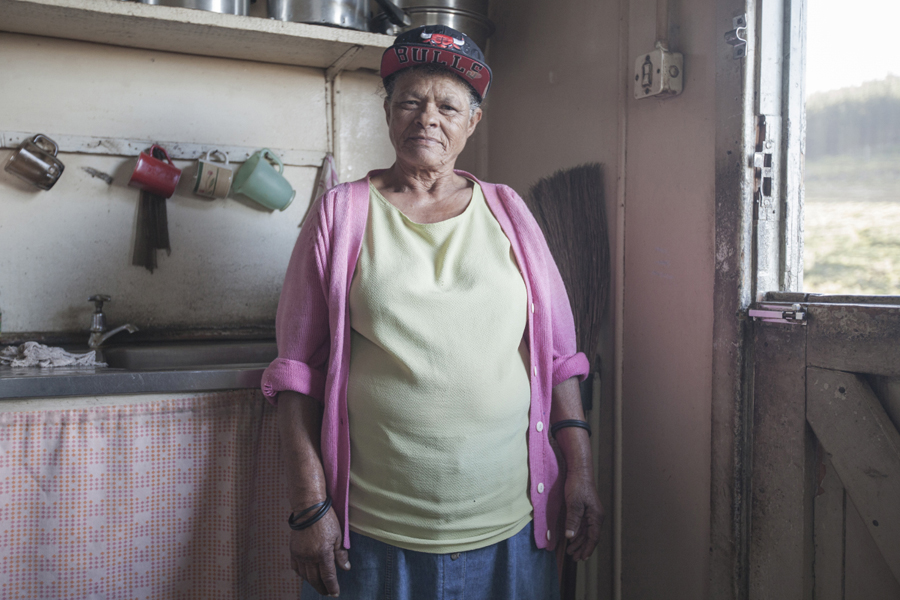
“Aunt Lucie” has lived in Sonskyn all her life. Photo: Luke Daniel
“DAFF need to actively engage with the community, and come up with solutions,” Ponoyi says.
There are 30 households in Sonskyn, with an average of six people per household, and only two household members permanently employed by the forestry company. Households survive by combining forestry wages of about R3,000 a month with social grants for pensioners, children and the disabled. If they have no jobs in forestry, the residents will leave, reducing Sonskyn to a ghost town, a remnant of the past.
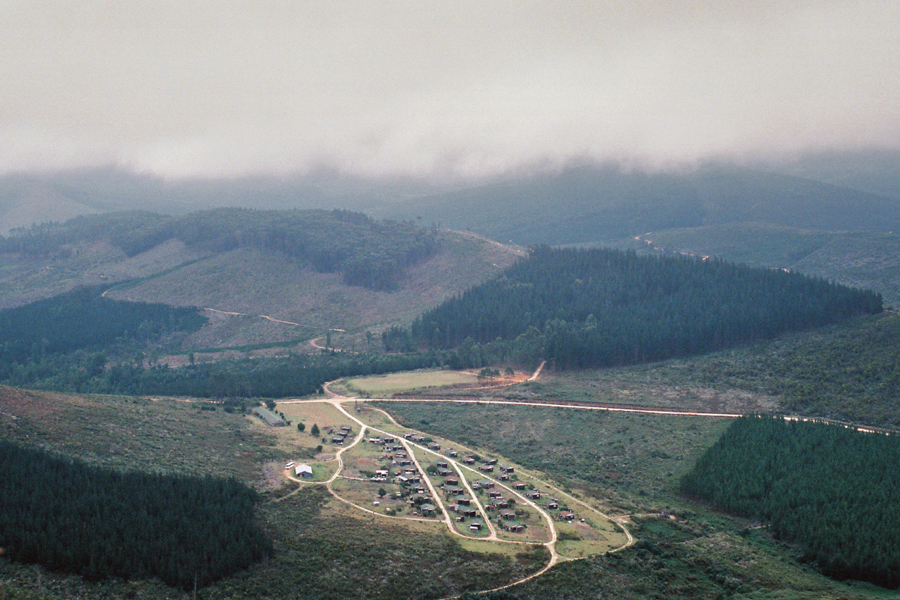
The small logging community of Sonskyn at the top of Buffelsnek in the Southern Cape. The modest wooden cottages are home to 180 men, women and children. Photo: Luke Daniel
With no official comment by the DAFF, rumours abound in Buffelsnek, with some residents fearing that the government will bring in Chinese plantation managers who will in turn bring in Chinese labour, leaving locals destitute.
Attempts to reach DAFF chief director of Communications Steve Galane via phone and email were unsuccessful. Mountain To Ocean suggested GroundUp contact Thandeka Gwala of DAFF with regards to the Exit Strategy in the Western Cape but calls were not answered. The Western Cape Department of Agriculture’s Giselle Terblanche said she could not comment.